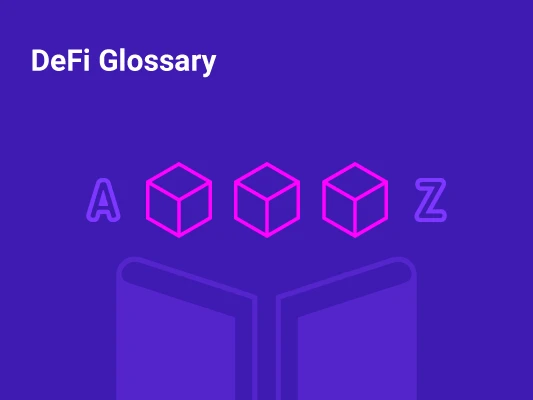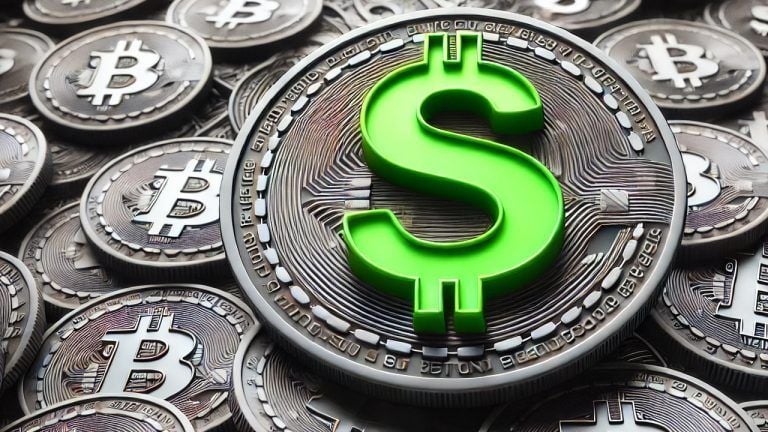DeFi Glossary

DeFi is one of the most essential innovations of blockchain technology. It revolutionizes the foundations of traditional financial systems and redefines traditional financial services such as lending, trading, investment, payment, insurance, etc., by disrupting the role of intermediaries.
DeFi continues to gain broader adoption, with the TVL, total value locked, growing 10x since May 2020,, and amounting to almost $172 billion throughout different DeFi applications worldwide.
While DeFi offers a plethora of opportunities to crypto investors, some of them might be overwhelmed by the unfamiliar DeFi terminology. So, if you’re among them, we got you covered.
Read on for a concise DeFi glossary of the basic DeFi terminology to help you understand how the DeFi ecosystem works and take advantage of its endless possibilities.
Let’s get right to it!
DeFi
DeFi stands for decentralized finance and is an umbrella term for a collection of financial products which rely on smart contracts and blockchains to enable peer-to-peer (P2P) financial services. Smart contracts allow for development of protocols that replicate traditional financial services in a more efficient, interoperable, and transparent way.
DeFi uses DApps and distributed ledger technology (DLT) to allow for permissionless financial transactions ranging from banking, loans, insurance, payments, and mortgages, to asset trading, margin trading, derivatives, etc., by disrupting the role of intermediaries such as banks and financial institutions. DeFi aims to democratize finance by replacing centralized institutions with peer-to-peer relationships and empowering anyone with a device and internet connection to access the full spectrum of financial services.
Annual Percentage Yield (APY)
APY is the annual percentage yield, and it means your annual compounded return from an investment. Your compounded return includes interest generated from the initial deposit plus the interest earned on that interest.
APY is a key metric for crypto investors to help compare returns between DeFi platforms or cryptocurrencies. You can earn APY by staking cryptocurrencies or via yield farming.
Automated Market Maker (AMM)
Automated Market Maker is a decentralized exchange protocol that uses algorithms to determine the price of the traded assets, unlike centralized exchanges that use the order book. Some of the best examples of AMM are Uniswap, PancakeSwap, etc.
AMMs use smart contracts to create their own liquidity pools, and they allow users to automatically and in a permissionless way trade against these liquidity pools.
DEX
DEX stands for decentralized exchange, a marketplace for buying, selling, or swapping cryptocurrencies without any central authority. Unlike a centralized cryptocurrency exchange, DEXs don’t offer a custodial wallet, leaving your assets totally under your control. DEXs don’t charge an exchange commission or a transaction fee.
DAO
A Decentralized Autonomous Organization (DAO) is a community-led entity with no central leadership. It’s fully autonomous, transparent, and governed entirely by community members who collectively make decisions about the project’s technical upgrades, treasury allocations, etc.
Smart contracts lay a DAO’s foundational rules, execute the decisions, etc. All proposals, voting, and even the code itself are available on the blockchain and can be publicly audited.
DApp
DApps are decentralized applications built on a decentralized peer-to-peer network supported by distributed blockchain ledgers. Smart contracts stored on a blockchain enable DApps to process data through distributed networks and execute transactions. DApps have no central authority or a single point of ownership, and once a developer has released a DApp’s codebase, others can build on top of it.
DApps are always accessible and don’t have a single point of failure. DApps can be developed to create a wide range of applications, including decentralized finance, web browsing, gaming, social media, crypto wallets, etc.
Flash Loan
Flash Loans are uncollateralized loans that allow you to borrow any available amount of assets, as long as the liquidity is returned to the protocol within one block transaction. The interest rate and the loan’s conditions are coded into the smart contract governing the flash loan.
If the borrower doesn’t repay the total amount of the loan before the completion of the transaction, the transaction is reversed by the smart contract, and the loan is nullified.
Liquidity Pool
A liquidity pool is a collection of crypto tokens secured under a smart contract on the DeFi platform. With smart contracts, anyone can deposit their tokens into the liquidity pool to provide liquidity on the platform and receive rewards in the form of trading fees or native tokens in return. Users who lock up their assets in liquidity pools are called liquidity providers.
Among the DeFi platforms making use of liquidity pools include lending platforms and DEXs.
Impermanent Loss
An impermanent loss happens when a user locks up crypto tokens in a liquidity pool to provide liquidity and earn interest, and the price of the tokens changes due to market volatility or other factors.
Stablecoins
Stablecoins are cryptocurrencies, the value of which is pegged to another currency, such as fiat currency, commodity, or financial instrument. The most popular stablecoins pegged to the US Dollar are USDT, USDC, DAI, etc.
Staking
DeFi staking is a rewards-type system that involves locking crypto assets in your cryptocurrency wallet for a specific period to verify blockchain transactions, contribute to the blockchain network's performance and safety, and earn rewards in the form of additional coins or tokens. DeFi staking only applies to a blockchain network that uses the Proof-of-Stake (PoS) consensus mechanism, in which staking is used to validate transactions. In the Proof-of-Stake mechanism, a participant node is allocated the responsibility to maintain the public ledger. The right to verify transactions is algorithmically assigned to users. So, staking involves locking a set amount of crypto assets to participate in validation, i.e., verify transactions as needed and earn staking rewards.
Users staking digital assets in a PoS blockchain for an agreed-upon period to generate passive income in return are called validators. PoS validators provide value to the network and are selected based on the higher number of staked assets.
TVL
Total Value Locked (TVL) is the total value of all the crypto assets staked in the smart contracts of a DeFi platform. It serves as an indication of the funds available on various DeFi platforms for transactional, borrowing, and lending purposes. TVL has emerged as a key metric for gauging interest in the crypto industry and has been developed primarily as a way to assess decentralized protocols and the DeFi system as a whole. A higher TVL suggests that a DeFi platform is healthy and in high demand.
Yield Farming
Yield farming is the process of lending or staking your cryptocurrency tokens in DeFi protocols in return for interest or other rewards. In yield farming, crypto holders deposit their funds to liquidity pools to provide liquidity to other users. Yield farmers measure their returns in terms of annual percentage yields (APY).
Protocol
DeFi protocols are programs or codes written on the blockchain and used for designing DApps. These protocols are represented by DApps that provide access to peer-to-peer financial services. DeFi protocols are autonomous programs designed to address setbacks in the traditional finance industry.
Smart Contracts
Smart contracts are self-executing contracts representing the terms and conditions of the buyer-seller agreement inscribed directly into lines of code. The code and agreement operate on the blockchain and control the contract’s automatic execution once predetermined requirements are met. Smart contracts ensure that transactions, such as DeFi lending, borrowing, etc., are trackable and irreversible and happen in a trustless manner, without any intermediary's involvement or time loss.
Underlying Tokens
A derivative is a financial contract between two or more parties that derives its value from an underlying asset, i.e., stocks, commodities, or tokens. Crypto derivative contracts don’t have direct value, instead, their value is solely based on the future price movements of the underlying token.
Slippage
Slippage is the difference between the expected price of an order and the actual price when the order executes. Due to the volatile nature of cryptocurrency, its price can fluctuate, moving up or down, and, slippage can be positive or negative, respectively.
Gas Fees
Gas fees are the fees charged for facilitating a transaction on a blockchain network. These fees, paid in a blockchain's native currency, are designed to compensate miners in exchange for the computational power they use to verify the transaction.
Gas fees on a blockchain network are not fixed and can change depending on various factors such as demand and supply, transaction throughput per second, etc.
Token’s Contract Address
A token’s contract address is the address location of the token contract or the location of a smart contract that manages the balance of all token holders.
Collateral
A crypto loan is a secured loan where borrowers use their crypto assets as collateral. They will get back their crypto assets held as collateral by the lender in exchange for liquidity when they repay the loan. You can get crypto loans ranging from 50% to 90% of your crypto’s values. If the price of the tokens you’ve put as collateral decreases during the loan period, you might need to deposit more collateral.
Aggregators
Aggregators are DeFi protocols that look through multiple DeFi lending platforms and liquidity pools to bring the very best APY into one place helping users optimize their trades. By bringing trades across various DeFi platforms into one location, a DeFi aggregator saves investors’ time and increases the crypto trading efficiency. Aggregators can also automatically invest your cryptocurrencies on the highest-yielding protocol to get you the best rates possible.



